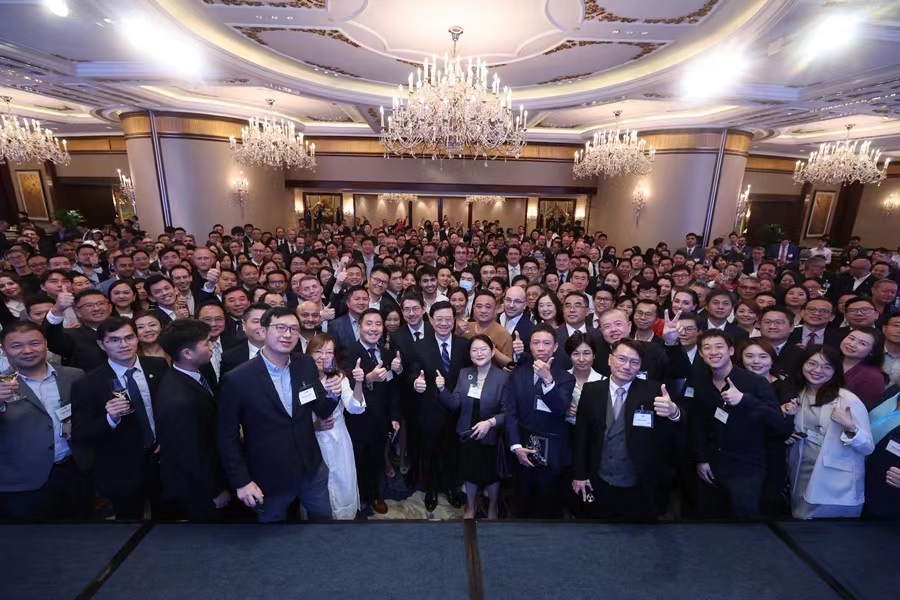[ad_1]

Editor’s note: Xi Jinping Thought on Socialism with Chinese Characteristics for a New Era is China-centered, and internationally applicable; it caters to the present and is geared towards the future. In CGTN’s Decoding China series, domestic and international high-profile officials and experts from various fields share their experiences and talk about Chinese governance and its global implication. In the third installment, Dr. Jimmy Chiang, acting director-general of InvestHK, Hong Kong Special Administrative Region (HKSAR) government, analyzes Hong Kong’s unique position as an International financial center and explains how Hong Kong will build itself into the International Center of Innovative Technology with the guidance of the “14th Five-Year Plan.”
CGTN: Chinese President Xi Jinping said that the long-term prosperity and stability of Hong Kong and Macao are part and parcel of the building of a strong China. HKSAR has played a vital role in international finance, logistics and trade. After the full resumption of travel between Hong Kong and the Chinese mainland, how will Hong Kong take advantage of its unique position to promote cooperation and development between the Chinese mainland and the SAR?
Jimmy Chiang: Underpinned by an open and free market and a fine tradition of the rule of law, Hong Kong continues to be recognized as the world’s freest economy with the best investment environment, a global financial center and one of the most competitive economies around the globe. Under the “One Country, Two Systems” principle, Hong Kong has the unique advantage of the strong backing of the mother country and the well-established connectivity with the world. Hong Kong remains the only place in the world where global advantage and China advantage amalgamate. The city is a two-way gateway connecting China and the world’s financial market. Many mainland enterprises have set up businesses in Hong Kong and use Hong Kong to “go global.” By the end of last year, a total of 2,114 mainland parent companies had established companies (regional headquarters, regional offices, etc.) in Hong Kong, accounting for 23.5 percent of the total number of overseas parent companies in Hong Kong. The figures reflect that Hong Kong, as an international business center, is full of attractiveness to enterprises.
President Xi said the principle of “One Country, Two Systems” must be adhered to in the long run: “The central government fully supports Hong Kong in its effort to maintain its distinctive status and edges, … to keep its business environment free, open and regulated, and to maintain the common law, so as to expand and facilitate its exchanges with the world.”
An International Monetary Fund (IMF) report has reaffirmed Hong Kong’s status as a major international financial center. It is believed that Hong Kong and the Chinese mainland enterprises can complement each other’s strengths, jointly enhance their competitiveness and open up a larger market.
As Hong Kong is well positioned by the benefit from the country’s dual circulation economic development model, the city is a conduit bridge for both the Chinese mainland and overseas companies against its own advantages. On the one hand, Chinese mainland enterprises could make use of Hong Kong to connect with the rest of the world, tapping opportunities from external demand. Meanwhile, Hong Kong maintains as an ideal location for both the Chinese mainland and overseas companies, especially the clusters from the ASEAN and from the Middle East, as a base to set up or expand their business in Hong Kong, the Greater Bay Area (GBA) and Asia, especially to catch up the fast development and increasing demand in GBA.
CGTN: As an externally oriented economy, Hong Kong is highly dependent on trade with the world. Hong Kong economy suffered during the pandemic. In the post-epidemic era, how will Hong Kong attract foreign investment to revive its economy? What measures and services does InvestHK take to encourage foreign investment in Hong Kong?
Jimmy Chiang: Due to the epidemic upsurge and tensions in geopolitics, Hong Kong suffered from the influence of a weak economy last year. However, it is clear that as the city resumes normalcy and restores full connectivity to the Chinese mainland and the rest of the world, its economy will improve notably this year with nearly 9,000 foreign companies operating in Hong Kong at a high level till last year.
“Policy Address 2022” outlined an array of new initiatives to proactively compete for enterprises and talents, with the goal of upgrading the overall competitiveness of Hong Kong. The SAR government has established a new Office for Attracting Strategic Enterprises (OASES) and Talents Services Unit to attract high-quality enterprises, investments and talents to Hong Kong. With a target of attracting high-potential and representative strategic enterprises from around the globe, in about six-month time, the OASES has met with more than 150 enterprises, many of which are industry leaders as well as companies engaging in cutting-edge technologies.
InvestHK is the department of the Hong Kong Special Administrative Region government to attract foreign direct investment and support the Chinese mainland and overseas businesses to set up or expand in Hong Kong. In recent years it expanded with new pillars, namely, the fintech and family office units to attract companies in these areas to set up in Hong Kong and develop a comprehensive ecosystem.

Over 400 senior representatives from various sectors of the Chinese mainland and foreign companies attend the reception held by InvestHK and hosted by HKSAR Chief Executive John Lee Ka-chiu in south China’s Hong Kong, June 15, 2023. /InvestHK
Over 400 senior representatives from various sectors of the Chinese mainland and foreign companies attend the reception held by InvestHK and hosted by HKSAR Chief Executive John Lee Ka-chiu in south China’s Hong Kong, June 15, 2023. /InvestHK
In June, InvestHK just welcomed over 400 senior representatives from the Chinese mainland and foreign companies at our grand reception, who had been assisted by InvestHK over the past three years in setting up business in Hong Kong. The representatives showed their lasting confidence in Hong Kong’s business environment, and InvestHK called upon them to continue using the city’s global advantage to expand their business worldwide.
In fact, in the first five months of 2023, InvestHK has assisted 186 Chinese mainland and overseas companies in setting up or expanding their operations in Hong Kong, an increase of 32 percent compared with the same period last year, reflecting that Chinese mainland and global companies are still confident in Hong Kong’s business environment. Among them, Chinese mainland companies accounted for more than 30 percent. The number is expected to maintain a growth momentum until the end of the year. InvestHK will continue to actively promote Hong Kong’s advantages in the second half of the year in the Chinese mainland and overseas, and to keep launching signature events like Hong Kong FinTech Week and StartmeupHK Festival. Meanwhile, we expand the Hong Kong family office team by adding hands around the world which aims to attract more global family office businesses to settle in Hong Kong.
CGTN: Hong Kong is positioned as the International Center of Innovative Technology in the “14th Five-Year Plan” by the virtues of “One Country, Two Systems,” Hong Kong’s judicial system, intellectual property protection, and its research and development ability. How has the entrepreneurial ecosystem been in Hong Kong in recent years? What steps will InvestHK take to achieve HK’s position as the International Center of Innovative Technology?
Jimmy Chiang: With the full support of the central government, as well as the plentiful opportunities under such national strategies as the “14th Five-Year Plan,” the Guangdong-Hong Kong-Macao GBA development and the Belt and Road Initiative, Hong Kong is the best place for investors to start and expand their business operations.
To achieve the vision of the “14th Five-Year Plan” in supporting Hong Kong to develop into an international Innovation and technology (I&T) center, the HKSAR government is enhancing our I&T ecosystem via developing infrastructure, promoting research, nurturing talent and supporting the industry.
Hong Kong is moving forward with the construction of the Hong Kong-Shenzhen Innovation and Technology Park. This “one zone, two parks” initiative will attract both the Chinese mainland and overseas I&T companies to Hong Kong and power the rise of the GBA as one of the world-class I&T hubs. The networks and opportunities available in Hong Kong and the synergies arising from the GBA are abundant. A brand-new development engine, the “Northern Metropolis,” will create synergies with Guangdong Province and contribute to the overall development of the GBA.
At the end of last year, the HKSAR government promulgated the “Hong Kong Innovation and Technology Development Blueprint,” which sets out eight major strategies under the four broad development directions. The Blueprint further enhances the I&T industry layout and moves toward the industrialization in I&T sector. Hong Kong is also the largest fundraising hub for biotechnology in Asia. Together with its enduring business advantages, as well as the huge market potential in the GBA with comprehensive government policy measures, we are confident that Hong Kong will embrace a golden era of the I&T industry in the future.
CGTN: President Xi said the “One Country, Two Systems” principle has been tested repeatedly in practice, it must be maintained over the long term. Due to the unstable global geopolitical environment, Hong Kong, as a world city and externally oriented economy, inevitably encounters challenges from the West. How will Hong Kong’s entrepreneurs sail through these challenges and build anti-risk ability?
Jimmy Chiang: Hong Kong’s financial system has a strong anti-risk ability. Although it has experienced unrest in the past few years, the system remains stable. Over a decade more, Hong Kong had topped the world seven times in terms of IPO funding. Meanwhile, Hong Kong is a leading asset management center in Asia. The “14th Five-Year Plan” supports Hong Kong to enhance its status as an international financial center.
With the central government’s persistent efforts in reform and opening-up and the acceleration of economic development, the number of high-net-worth individuals in the Chinese mainland, especially in the GBA has increased. The group would be encouraged to make full use of Hong Kong’s wealth management, financial and legal services to set up family offices in Hong Kong. Through different measures, the HKSAR government provides a full range of supporting facilities and services for global family offices and asset owners to settle in Hong Kong. And the Family Office Tax Relief Act was also passed in May this year. InvestHK timely established a dedicated Family Office team who offers a wide range of customized services, free of charge, to support relevant family offices in setting up in Hong Kong.
Hong Kong’s economy improved significantly in the first quarter of this year, with its GDP growing by 2.7 percent year-on-year. Since the new SAR government took office, it has focused on attracting key enterprises, talents and capital from all over the world to Hong Kong. Following the call of “telling good stories of Hong Kong,” InvestHK shall implement and develop markets in the Middle East, Southeast Asia, Central Asia, as well as Africa, promote Hong Kong’s strengths in financial services, professional services and innovation and technology, and actively follow up business plans to settle or expand business in Hong Kong. We will work with our Chinese mainland and overseas colleagues to assist Chinese mainland and global companies to catch up and leverage the huge opportunities that Hong Kong embraces under the “One Country, Two Systems” with its institutional and geographical advantages.
Hong Kong will continue to serve its distinctive roles as a gateway, springboard and intermediary, actively connect with the national development strategy and contribute to the high-quality development of the country
(If you want to contribute and have specific expertise, please contact us at opinions@cgtn.com. Follow @thouse_opinions on Twitter to discover the latest commentaries in the CGTN Opinion Section.)
[ad_2]
Source link
